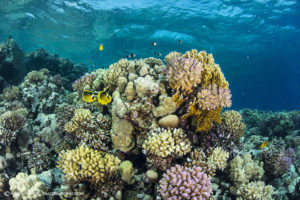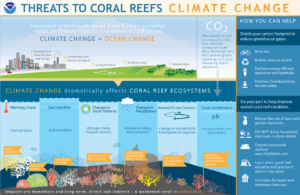Coral Reefs at Risk
“Many people ask me what it is we can do to help our environments… I think the answer to that is real simple, just leave them the hell alone.” – Bernie Krause
 The range of pressures and impacts on corals and coral reefs attributable to human populations is vast. Some of these are direct pressures: overfishing; indiscriminate fishing practices using dynamite or poison; catching live reef fish for the aquarium and restaurant trade; damage and degradation caused by the development of tourism complexes and other tourist activities; industrial and agricultural runoff; marine pollution… the list goes on.
The range of pressures and impacts on corals and coral reefs attributable to human populations is vast. Some of these are direct pressures: overfishing; indiscriminate fishing practices using dynamite or poison; catching live reef fish for the aquarium and restaurant trade; damage and degradation caused by the development of tourism complexes and other tourist activities; industrial and agricultural runoff; marine pollution… the list goes on.
Of course, some reefs in remote locations do not suffer as much from these pressures. Yet the sobering fact is that nowhere are coral reefs now immune from the increasing and dramatic effects that climate change is having on the oceans, particularly in rising ocean temperatures and greater ocean acidification. The evidence of this, half way through 2016, is plain by the number of reports of bleaching events coming in from around the globe, the highest profile of which has undoubtedly been on the Great Barrier Reef. See, for example, The Great Barrier Reef – A catastrophe laid bare (The Guardian).
Bleaching is the name of the process in which corals lose their colour as a result of stresses usually caused by warmer water. There are countless examples of other locations around the world where reefs have been affected (e.g. Thailand, the Maldives or Hawaii)
It is possible for some types of coral to recover in certain circumstances, but many will be unable to recover, eventually becoming coral graveyards covered by slimy green algae. From being a nursery and playground for fish and other species, a resting spot for giant migratory species such as manta rays, whale sharks and many others, they become colourless deserts.
Cordio East Africa (Coastal Oceans Research & Development) have created a useful short video explaining what bleaching actually is.
More information about threats to Coral Reefs
Reefs at Risk Revisited is a report published by the World Resources Institute. It has a wealth of information about the different threats coral reefs face, the type of risks they are up against by region and the social and economic implications of reef loss.

In June 2016, the 13th International Coral Reef Symposium took place in Hawaii. A key focus of the symposium was to look at how all the research and science being directed at understanding threats to corals and coral reefs can actually be translated into effective policy and practice. There is growing recognition that, despite the explosion in the number of research papers and studies in recent years, the situation for coral reefs around the world is simply going from bad to worse. Given the importance of coral reefs to people and planet (Why Coral Reefs Matter), there needs to be a focus on collaborating to find effective solutions to help both conserve coral reefs where they are in reasonable condition, but also to work out how to manage water quality in areas with degraded reefs to allow them to be restored. (See Conservation).
Against a backdrop of bad news for coral reefs, there are nevertheless reasons for optimism. It is possible for coral reefs to recover from bleaching events. Some coral species have shown to be more resilient to the effects of climate change than others. There appears to be a growing consensus around the need for concerted, collaborative action to arrest the decline of coral reefs. Many smaller nations, particularly in the Pacific, are taking the threat of climate change very seriously as they are at ‘the front line’ of that change. Governments and politicians in these states are getting behind concrete and often unprecedented measures designed at protecting their waters and what they contain.
Even so, the more we understand the threats to corals and coral reefs, and the more these can be disseminated to a wider public, the more chance we will have of protecting these unique ecosystems. At the bottom of this page there are links to further sources of information about all things coral-related.
The International Society for Reef Studies Consensus Statement on Climate Change and Coral Bleaching, October 2015
ISRS-Consensus-Statement-on-Coral-Bleaching-Climate-Change-FINAL-14Oct2015-HR

